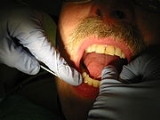ziomek1975
Did you know that more than 20 million of Americans More than 20 million Americans suffer anxiety about visiting the dentist to the extent that some avoid dental checkups altogether.
"Regular visits to the dentist are very much crucial to your oral health, and avoiding them can lead to bigger oral health problems later on,"
The good news is that today, no one need to fear the dentist. Modern
Procedures make most dental work virtually painless.
Moreover, there are a variety of techniques that an be used to relax fearful patients during dental visits."
In addition to fear of pain, fear of dental visits can be associated with embarrassment about one's
Current dental condition, particularly if it's caused by neglect; a sense of lost control, especially for those who feel they can't communicate with their dentists during particular procedures; or a general fear of the unknown.
Gain control. Eliminating the unknown is a big step in helping overcome fears.
-Learn as much as you can about the procedure you're having done, and take an active part in decisions about your treatment. Ask your dentist to explain the procedure to you ahead of time and feel free to ask questions.
-Communicate with your dentist. Don't be embarrassed if you're nervous about a particular procedure. Communicate these fears to your dentist so he or she will have a better understanding of how to treat you during the procedure.
-Develop a signal with your dentist. Knowing you can stop a procedure at any time will go a long way toward alleviating your fears in the dental chair. Let your dentist know that you'll raise your hand or signal in some other way if you need a short break during a procedure.
-Find a distraction. Many dentists now provide television, headsets with music or virtual-reality-type glasses that can help distract you during a procedure and block out the sound of dental instruments, which can trigger anxiety.
-Discuss pain control with your dentist. Modern dentistry offers a variety of effective pain control and anxiety control medications. Review your options with your dentist to learn which one is right for you and your particular procedure.
"Regular visits to the dentist are very much crucial to your oral health, and avoiding them can lead to bigger oral health problems later on,"
The good news is that today, no one need to fear the dentist. Modern
Procedures make most dental work virtually painless.
Moreover, there are a variety of techniques that an be used to relax fearful patients during dental visits."
In addition to fear of pain, fear of dental visits can be associated with embarrassment about one's
Current dental condition, particularly if it's caused by neglect; a sense of lost control, especially for those who feel they can't communicate with their dentists during particular procedures; or a general fear of the unknown.
Gain control. Eliminating the unknown is a big step in helping overcome fears.
-Learn as much as you can about the procedure you're having done, and take an active part in decisions about your treatment. Ask your dentist to explain the procedure to you ahead of time and feel free to ask questions.
-Communicate with your dentist. Don't be embarrassed if you're nervous about a particular procedure. Communicate these fears to your dentist so he or she will have a better understanding of how to treat you during the procedure.
-Develop a signal with your dentist. Knowing you can stop a procedure at any time will go a long way toward alleviating your fears in the dental chair. Let your dentist know that you'll raise your hand or signal in some other way if you need a short break during a procedure.
-Find a distraction. Many dentists now provide television, headsets with music or virtual-reality-type glasses that can help distract you during a procedure and block out the sound of dental instruments, which can trigger anxiety.
-Discuss pain control with your dentist. Modern dentistry offers a variety of effective pain control and anxiety control medications. Review your options with your dentist to learn which one is right for you and your particular procedure.


